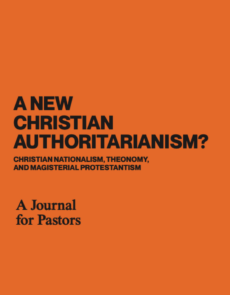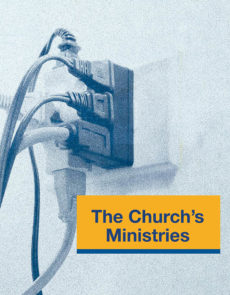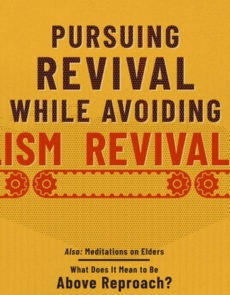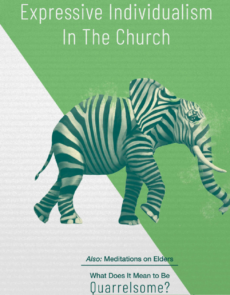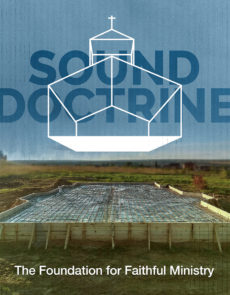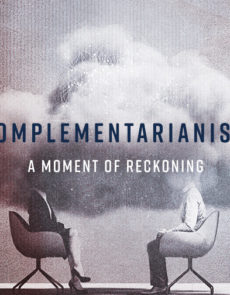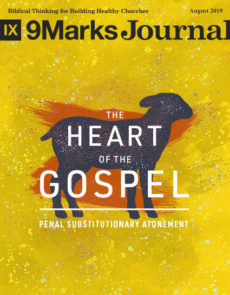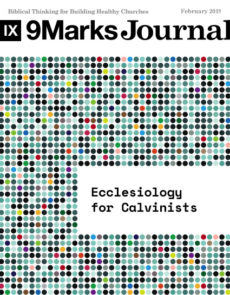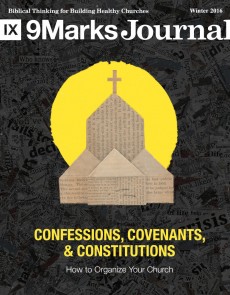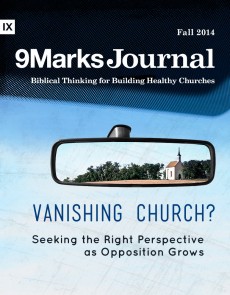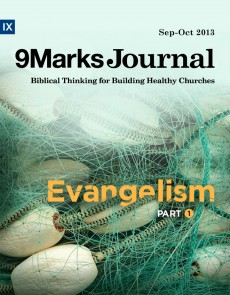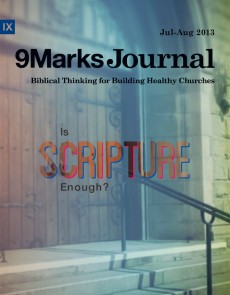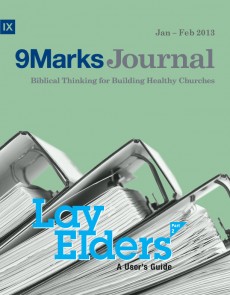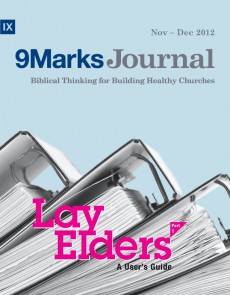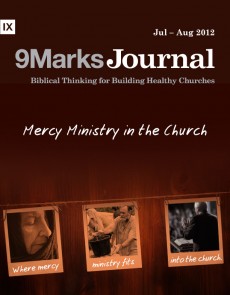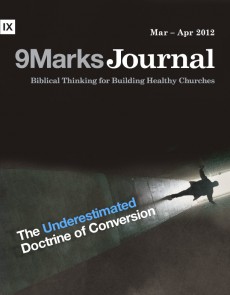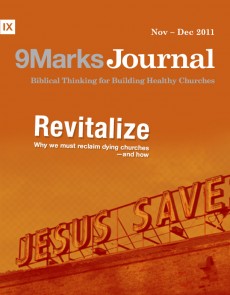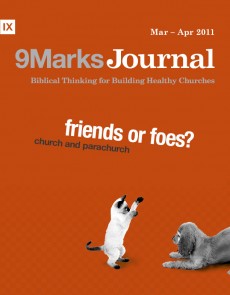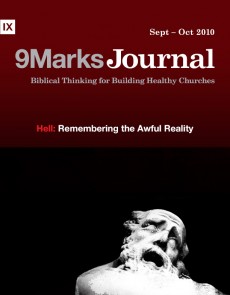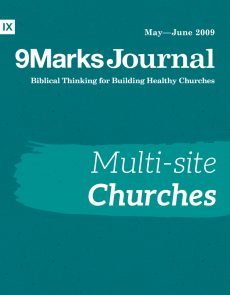PSA AS THE HEART OF THE GOSPEL

What Did the Cross Achieve?: The Logic of Penal Substitution
By J. I. Packer | 9Marks Journal: The Heart of the Gospel: Penal Substitutionary Atonement | 08.20.2019The task which I have set myself in this lecture is to focus and explicate a belief which, by and large, is a distinguishing mark of the word-wide evangelical fraternity: namely, the belief that the cross had the character of penal substitution, and that it was in virtue of this fact that it brought salvation to mankind.

Four Questions to Ask about the Atonement
By Stephen J. Wellum | 9Marks Journal: The Heart of the Gospel: Penal Substitutionary Atonement | 08.20.2019It is only in viewing Christ as our penal substitute that we truly understand the depth of God’s holy love for us, the horrendous nature of our sin before God, and the glory of our substitute—Jesus Christ our Lord.

What Is Penal Substitution?
By Jarvis J. Williams | 9Marks Journal: The Heart of the Gospel: Penal Substitutionary Atonement | 08.20.2019What exactly does “penal substitution” mean?

Did Jesus Affirm Penal Substitutionary Atonement?
By Bobby Scott | 9Marks Journal: The Heart of the Gospel: Penal Substitutionary Atonement | 08.20.2019Did Jesus himself understand his death as a penal substitutionary atonement? Or did later New Testament authors make it up?

20 Quotes from It Is Well: Expositions on Substitutionary Atonement
By M. Dever, M. Lawrence | 9Marks Journal: The Heart of the Gospel: Penal Substitutionary Atonement | 08.20.201920 quotes from It Is Well, a book by Mark Dever & Michael Lawrence.
PSA AND ITS CHALLENGERS

Answering 4 Common Objections to Penal Substitutionary Atonement
By Stephen J. Wellum | 9Marks Journal: The Heart of the Gospel: Penal Substitutionary Atonement | 08.20.2019At the root of every caricature of penal substitutionary atonement is a distorted doctrine of God.

Does Penal Substitutionary Atonement Rupture the Trinity?
By Kevin DeYoung | 9Marks Journal: The Heart of the Gospel: Penal Substitutionary Atonement | 08.20.2019How do we preach the cross without communicating some kind of rupture in the Trinity?

Nothing To Be Ashamed Of: Penal Substitutionary Atonement In Honor-Shame Cultures
By A. Samuel, A. Sequeira | 9Marks Journal: The Heart of the Gospel: Penal Substitutionary Atonement | 08.20.2019Penal substitution offers a helpful corrective to those living in an honor-shame culture, and helps them rightly understand their status before God and what God has done for sinners in Jesus Christ.

Did the Church Fathers Affirm Penal Substitutionary Atonement?
By Brian Arnold | 9Marks Journal: The Heart of the Gospel: Penal Substitutionary Atonement | 08.20.2019Did the church fathers also hold to the doctrine of penal substitution? The answer is yes and no.
PSA AND ITS DOCTRINAL CONNECTIONS

How Does Penal Substitution Relate to Other Atonement Theories?
By Stephen J. Wellum | 9Marks Journal: The Heart of the Gospel: Penal Substitutionary Atonement | 08.20.2019Penal substitution best accounts for why the divine Son had to die, and why he alone saves.

Lose Particular Redemption, Lose Penal Substitution
By Sinclair Ferguson | 9Marks Journal: The Heart of the Gospel: Penal Substitutionary Atonement | 08.20.2019Penal substitution implies efficacious redemption.

How Does the Cross of Christ Make Sense of the Kingdom of God?
By Jeremy Treat | 9Marks Journal: The Heart of the Gospel: Penal Substitutionary Atonement | 08.20.2019From the bruised heel of Genesis 3:15 to the reigning lamb of Revelation 22:1, the Bible is a redemptive story of a crucified messiah who brings the kingdom through his atoning death on the cross.

The Love Story of Penal Substitutionary Atonement
By Michael Lawrence | 9Marks Journal: The Heart of the Gospel: Penal Substitutionary Atonement | 08.20.2019The entire storyline of Scripture, the history of redemption, is the story of God providing substitutes for his people to cover their shame and bear the judgment they deserved so that they might be accepted by him.

God of the Cross: 5 Recommended Books on the Atonement
By Owen Strachan | 9Marks Journal: The Heart of the Gospel: Penal Substitutionary Atonement | 08.20.2019Consider recommending these five books on this precious doctrine to your people.
PSA AND COUNSELING

The Necessity of Penal Substitution for Suffering Saints
By Whitney Woollard | 9Marks Journal: The Heart of the Gospel: Penal Substitutionary Atonement | 08.20.2019The doctrine of penal substitutionary atonement keeps me sane and secure amid suffering.

Pastoring Abuse Sufferers with the Doctrine of Penal Substitutionary Atonement
By Mez McConnell | 9Marks Journal: The Heart of the Gospel: Penal Substitutionary Atonement | 08.20.2019As a former victim and as a pastor to the abused, I wish to look at some of the practical implications of holding to PSA.

Why Penal Substitutionary Atonement Matters for Counseling
By Patti Withers | 9Marks Journal: The Heart of the Gospel: Penal Substitutionary Atonement | 08.20.2019As counselors, we must help our counselees see that because of Christ’s substitutionary atonement they can have relief from guilt and shame, a proper view of forgiveness, and access to the Father.
PSA AND WORSHIP

How to Explain Covenantal Headship to Your Members
By Harry Fujiwara | 9Marks Journal: The Heart of the Gospel: Penal Substitutionary Atonement | 08.20.2019In explaining covenantal headship to your members, it will be helpful to walk them through three closely related biblical truths: total depravity, the virgin birth, and substitutionary atonement.

Explaining Penal Substitutionary Atonement in Our Personal Evangelism
By Elliot Clark | 9Marks Journal: The Heart of the Gospel: Penal Substitutionary Atonement | 08.20.2019In our personal evangelism, to what degree should we explain PSA as we seek to make sense of the bloody cross, the vanguard of our Christian gospel?

How Charles Finney (and other Overly Emotional Preachers) Made It Difficult to Preach the Gospel
By Johnny Lithell | 9Marks Journal: The Heart of the Gospel: Penal Substitutionary Atonement | 08.20.2019How can a church in a secular setting work toward a culture where discussing God’s wrath and substitutionary atonement isn’t frowned upon but celebrated?

Ten Atonement Songs You Should Consider Singing
By Bob Kauflin | 9Marks Journal: The Heart of the Gospel: Penal Substitutionary Atonement | 08.20.2019We will never have enough songs to extol the glory of the Lamb who was slain to purchase our salvation.

“Jesus Died for Sinners”: Do Your People Know What This Actually Means?
By Conrad Mbewe | 9Marks Journal: The Heart of the Gospel: Penal Substitutionary Atonement | 08.20.2019Some professing Christians don’t know what it means when we say “Jesus died for you.” Pulpits are to blame for this serious confusion.

On the Inexhaustible Riches of Preaching Christ and Him Crucified
By Jeremy Walker | 9Marks Journal: The Heart of the Gospel: Penal Substitutionary Atonement | 08.20.2019Christ in his death and resurrection is the beating heart of the gospel. So preach penal substitutionary atonement in all its range and richness.
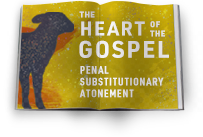
Free Download
PDF, ePub, and Kindle files will be sent to this email address. As part of our community, you will receive content & communication from 9Marks. You may unsubscribe at any time.
Support 9Marks
Our work is possible by the generosity of our readers. Give Today












